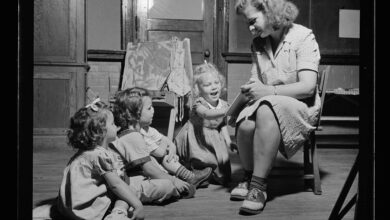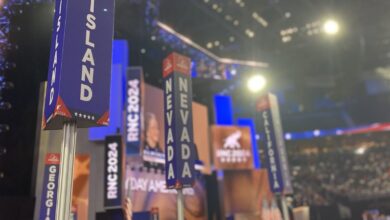Relax, GOP. A veto-proof Democratic legislature won’t fix NV’s upside down tax system. (Sadly) • Nevada Current

Republican Gov. Joe Lombardo’s top priority over the next seven months until the 2024 election will be exactly the same as his top priority over the last 8 months since the 2023 legislative session ended: Do whatever he can to help the Better Nevada PAC that loves him defeat a few Democratic assembly candidates and deprive Democrats of the supermajority they have in that chamber now.
Because if Democrats hold that supermajority and also win a supermajority in the state senate – a not unrealistic scenario – Democrats would be able to override Lombardo’s vetoes, of which there were about six dozen last year.
If Democrats have veto-proof majorities in both chambers, some of those vetoed bills would presumably be revived. For instance, in recent months Democrats and allied organizations have been highlighting Lombardo’s veto of a bill designed to lower prescription drugs prices, as well as several vetoes of legislation designed to protect renters from quickie evictions, junk fees, and in the case of seniors, excessive rent hikes.
But for Republicans, an ever-present big scary monster under the bed is some sort of tax increase, specifically on business, industry, or even – gasp – rich people.
Taxes can only be increased or created in Nevada with approval from two-thirds of both houses. And a state tax structure that punishes low-income households needs to be reformed.
Spoiler: Even if they have supermajorities in both houses, Democrats won’t be doing that in 2025.
Lombardo ran for governor in 2022 promising “no new taxes,” even though his Democratic opponent, former Gov. Steve Sisolak, wasn’t proposing any, and nor was any Democratic lawmaker within shouting distance of their party’s legislative leadership.
Which is a crying shame of course.
In Nevada, the smaller your income, the higher the percentage of your income you pay in taxes. As a result, Nevadans with the lowest incomes pay an effective tax rate that is more than four times higher than that paid by the state’s wealthiest residents. Hitting people at the bottom harder than those at the top, Nevada’s tax structure is upside down and bass-ackwards. Any thoughtful policy maker should be appalled at having anything to do with allowing the status quo to continue.
One illustrative juxtaposition of how morally reprehensible Nevada’s tax system is: The state’s tax on gambling revenue is the lowest in the solar system, while the regressive sales tax rate ranks among the nation’s highest. As a result (and “neener neener,” the resort industry might add), the tax rate paid by average Nevadans when they buy pet food, a used car, or a sandwich for lunch is 24% higher than the tax rate the world’s largest casino corporations pay on Nevada gambling revenue.
One might assume an upside-down tax structure that overburdens low-income households while coddling the rich and corporate is exactly the sort of thing Democrats, given veto-proof majorities, might reform. Party of the working class, after all.
They won’t.
Last year, Democratic Assemblywoman Natha Anderson introduced a resoluton that would have authorized “a study regarding wealth taxes.”
Needless to say, Republicans freaked out.
But the far more consequential reaction to Anderson’s resolution came from Democrats on the Assembly Revenue Committee. The committee, controlled by Democrats in a chamber with a Democratic supermajority, didn’t even hold a vote on the bill – a mere study bill – and let it die in a desk drawer.
The charitable view of legislative Democratic refusal to even study the unfairness of the state’s tax structure is the practical political one: If they passed the bill, it would be a gift to Lombardo and the PAC that loves him, which now would be jumping up and down and shouting that Democrats wanted to raise taxes. Why would Democrats give Republicans such a juicy opportunity to hammer them over a bill that didn’t even propose any actual policy? Doing so would be bad politics.
A concomitant, and less charitable, view would be that Nevada legislative Democrats have zero confidence in their own ability to honestly confront one of most regressive tax structures in the United States, so they would prefer not to talk about it at all and pretend it isn’t a problem.
Well, the Reid machine was built to win elections, not reform policies that make life harder for Nevadans than it needs to be.
And when the next general session of the Nevada Legislature starts in February 2025, it will be the longest ongoing campaign event of the 2026 election cycle, with Democrats dedicated to doing nothing whatsoever that might be awkward for whoever they think their gubernatorial nominee is going to be. That circumstance would trump tax fairness even if tax fairness was a Democratic legislative priority, which it’s not.
Lombardo and Republicans can and will find all manner of other legislative-related (or loosely related) things to campaign on in their battle to prevent Democratic supermajorities in both houses. Making macro-dramas out of micro-scandals is an old stand-by, so watch for that.
But whatever Republicans might say, this year’s campaigns for control of the assembly and senate will have nothing to do with turning the state’s upside down tax system right side up. Because neither will next year’s legislature, whatever its composition.




